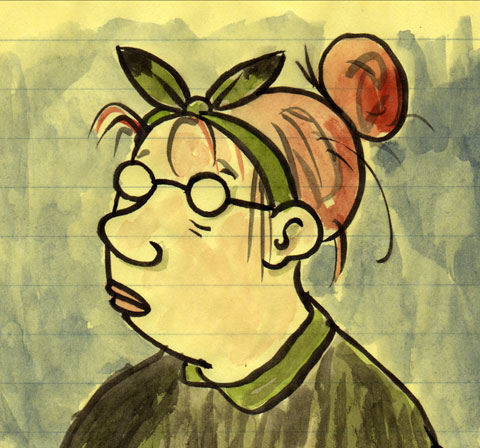
“A story or a drawing always stops. There’s this part where it just gets quiet, almost to sort of gather itself again.” |
In high school, we passed Lynda Barry’s comic books around the way some girls trade Judy Blume paperbacks. Her art was brutal, as awkward as our own self-images, and the words crowding each page were ungrammatical and painful and immediately recognizable. Because her comics seemed to run on sheer instinct, it came as a surprise to discover that she’s also a brilliant formalist who’s been thinking and writing about how art works for decades. Barry will be at Wellesley College on Friday, reading from her work along with the equally amazing cartoonist Alison Bechdel, so I took the opportunity to pick her brain.
So, I'm actually really nervous to talk to you.
[Laughter] If you know anything about me, you know why I'm laughing.
I actually wanted to start off that way, because I saw you when you came to Brookline Booksmith a while ago.
Oh, yeah. I had a good time. They had whiskey for me in the back room, and that was really difficult because I just wanted to climb in the bottle with it.
Well, the first thing that you did was that you came out and you sang. As I recall, you were actually shaking.
Yeah!
Does that happen every time?
Oh yeah. [Laughter] Yes, it happens every time. The two things that can help it, well, one is singing. And singing goes along with this idea I have of the role that this stuff plays, its biological function — but once you've sung, you've already done it, you know what I mean? And also telling a joke helps.
It's like when I used to ice skate, I'd always try to fall on my face as quickly as I could.
So you could just get that part done.
Yeah, it didn't actually hurt that much, and then I wouldn't be too scared of it.
Yeah, so your muscles weren't prepared for that.
Exactly.
You know actually ice skating, for me, there's some stuff I've been trying to figure out about paintbrushes and lines, and I would like, read all these books and do all this stuff, and it was ice skating — watching figure skaters, I was like "Ohhhhhhh." Like when they jump in the air, it's like between letters, you know? When you're writing, you keep that same kind of velocity, that's the whole point. It's like ice skating. They jump up in the air and it was like this part between letters, and I was just blown away by it.
Like when you pick up your hand from the paper.
Yes, between the letters.
But the motion continues.
Yeah. it's still within that same gesture.
They're still skating even though they're not touching the ice — and you're still drawing even though you're not touching the paper.
Exactly. And also there's something about an edge, you know, like the whole thing is skating on an edge, and there's something about the brush that's a similar thing. You have to figure out, are you pushing or pulling it across this surface? And it was while watching them that I really had this epiphany about it. And then I was talking to one of my godsons, and he goes "Yeah, that's why they call it figure skating — they make figures!" And I was like, "OH my GOD." And then his dad, who knew a lot about skating, said that he remembers when he was young they would actually try to write all the letters.